Brigette Lundy-Paine and Jane Schoenbrun on I Saw the TV Glow

I Saw the TV Glow might just be the best film of 2024 – thanks, in no small part, to Brigette Lundy-Paine, an actor whose peculiar intensity makes that titular glow even brighter, and to its mega director Jane Schoenbrun.
Culture
Introduction: Jade Wickes
Photography: Collier Schorr
Styling: Danielle Emerson
Taken from the autumn ’24 print issue of THE FACE. Get your copy here.
The last time Brigette Lundy-Paine and Jane Schoenbrun hung out was back in
February, at Charli xcx’s Boiler Room gig in New York. The hottest spot for anyone to be
seen dancing in the city, but not the most conducive place for a catch-up.
Since then, the film that first brought actor and director together has been unleashed on the world. Well on its way to becoming a cult classic, I Saw the TV Glow
is a horror chiller that literally glows with atmosphere, nostalgia and the suffocating dread of teenagehood. A breakout moment for Brigette and a rave-reviewed A24 debut for Jane,
the film’s received the kind of praise that can – and almost certainly will – change the
trajectory of their careers.
This conversation, then, is a much-anticipated regroup for the pair, whose relationship developed while working on …TV Glow. Quick synopsis: in mid-’90s American suburbia, the adolescence of awkward, meek teenager Owen (Justice Smith) is marred by a deep-seated sense of isolation and discomfort. It’s a feeling that can only be relieved by his immersion in The Pink Opaque, a drama-within-the-drama that sees two dungaree-wearing teenage girls fight fantastical monsters rendered in shoddy SFX (think: Buffy the Vampire Slayer, a show Jane watched religiously). An available form of escapism for Owen, he bonds with Brigette’s Maddy – a slightly older, more self-assured schoolmate – over their shared obsession with the show.
When The Pink Opaque gets cancelled, Maddy mysteriously disappears. Featuring shoegaze‑y original music by Phoebe Bridgers and Caroline Polachek, alongside a brilliant score by Alex G, the film alchemises ’90s references and an intense feeling of claustrophobia. Of being stuck inside your own head, your own life – your own TV screen.

Brigette wears coat MARC JACOBS
Jane, 37, has spoken about …TV Glow as an allegory for transness that specifically refers to the “egg crack” moment when a person realises they’re trans. They wrote the script early in their own transition, distilling the intensity of that time into the film and capturing the layered complexity of their experience in the process.
Brigette, 30, who is non-binary and queer, was understandably drawn to the screenplay, not least because they’d also loved Jane’s Covid-era indie horror We’re All Going to the World’s Fair (2021). Brigette first made a name for themself on Netflix hit Atypical (2017 – 21), in which autistic teenager Sam (Keir Gilchrist) navigates coming-of-age. They played his younger sister Casey, a role that generated dedicated fan pages and YouTube compilations of the Texan actor’s best scenes. Since then, they’ve acted in a handful of films, including 2018 comedy Action Point, 2019 political drama Bombshell and 2020 sci-fi comedy sequel Bill & Ted Face the Music. Later this year, they’ll release their directorial debut, October Crow. But no role has proved to be more formative than that of Maddy in I Saw the TV Glow.
As Jane, calling in from their New York apartment, leans into their laptop to ask Brigette eager questions about the state of the world/their mind, the latter sits serenely in their own apartment in the city. It’s time for a debrief, an unpacking and, apparently, some deep thoughts about zombies.

Shirt, trousers and tie PRADA
Jane Schoenbrun: Hi Brigette! Shall we talk about how we first met and what drew you to playing Maddy in I Saw the TV Glow?
Brigette Lundy-Paine: I was sent your film We’re All Going to the World’s Fair, which I was really moved and haunted by and curious about. Then we met over Zoom and connected immediately. I think we were both navigating the same questions of what it meant to find balance between binaries in our gender and also genre. How we wanted to communicate our ideas.
Then you sent me the script for …TV Glow. I read it in a wash of colour and intense emotion. It didn’t feel like a script, but like sounds and sensations: bright blues and pinks and loneliness. I was drawn to Maddy because she felt like a part of me that I recognised, a pattern in relationships that I was familiar with. I think I’m drawn to people who are very smart, intuitive souls. I also felt like I was in a place in my life of gender expression [when I read the script] – I wanted to break something, to stop explaining.
Maddy does a monologue in the film. It’s so poetic. I understood her on a psychic level, deep in my gut. I knew that it would be less about trying to make the text work or to play this character, but to let this character affect me.
We’ve not seen each other for a while. How’s your summer going?
My summer’s awesome. Our AC broke for the last two days and we’ve been sleeping in the heat, which I really like. It’s a lizard feeling. And I’ve been doing this movie…
How is your experience on it compared to I Saw the TV Glow?
It’s a zombie comedy called Queens of the Dead and it’s directed by Tina Romero, who is [horror legend and zombie movie pioneer] George Romero’s daughter. She and her friend Erin Judge wrote it. It’s got a rock star cast. It’s like drag zombies: [Drag Race star] Nina West, Dominique Jackson [Pose], Katy O’Brian [Love Lies Bleeding].
It’s a lot of genius comedians, which is different from …TV Glow; that felt like serious actors. Spencer Pazer, the set photographer on …TV Glow, was on set the other day. I broke down in humiliation. I was like: “Spencer, it’s so crazy for you to see me like this. I’m in a crop top and blonde wig.” The fact that I can do both […TV Glow and a zombie film] is almost embarrassing. I’ve been coping with my fluidity.
Why does that embarrass you?
We like to hold each other accountable to being the same all the time. Doing this movie – and I think [I realised this] during …TV Glow – I’m so flexible. I can do anything; I don’t have a stable persona, which is why I’m a good actor. But I always feel like I’m letting people down.
Do you feel like that was a need which drew you to acting?
I think both things informed each other. Because I’ve been acting since I was so young, I’ve always been trained to be super-flexible. But I do think I have a very curious spirit that wants to try on different personalities.
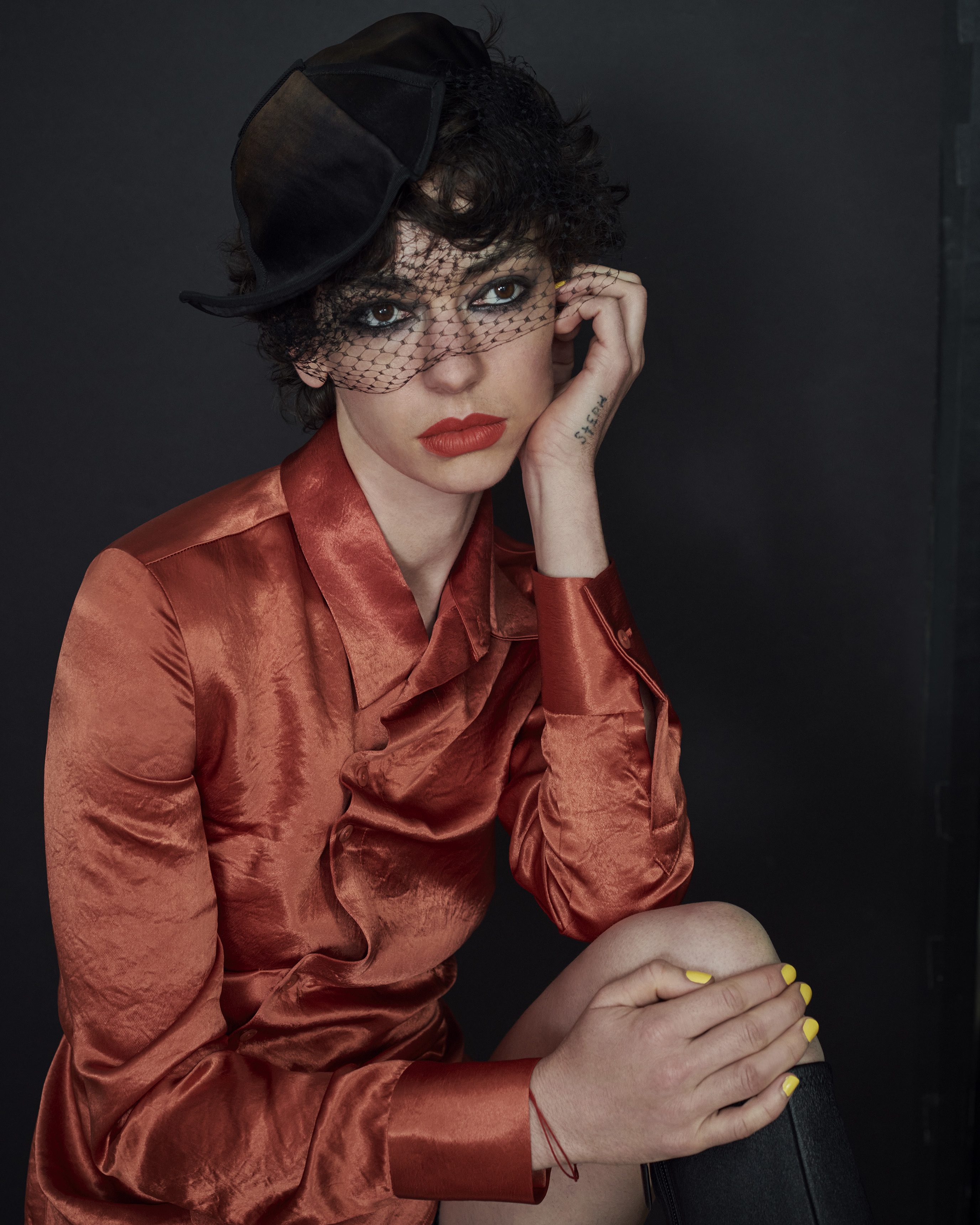
Shirt COMMISSION and headpiece courtesy of New York Vintage
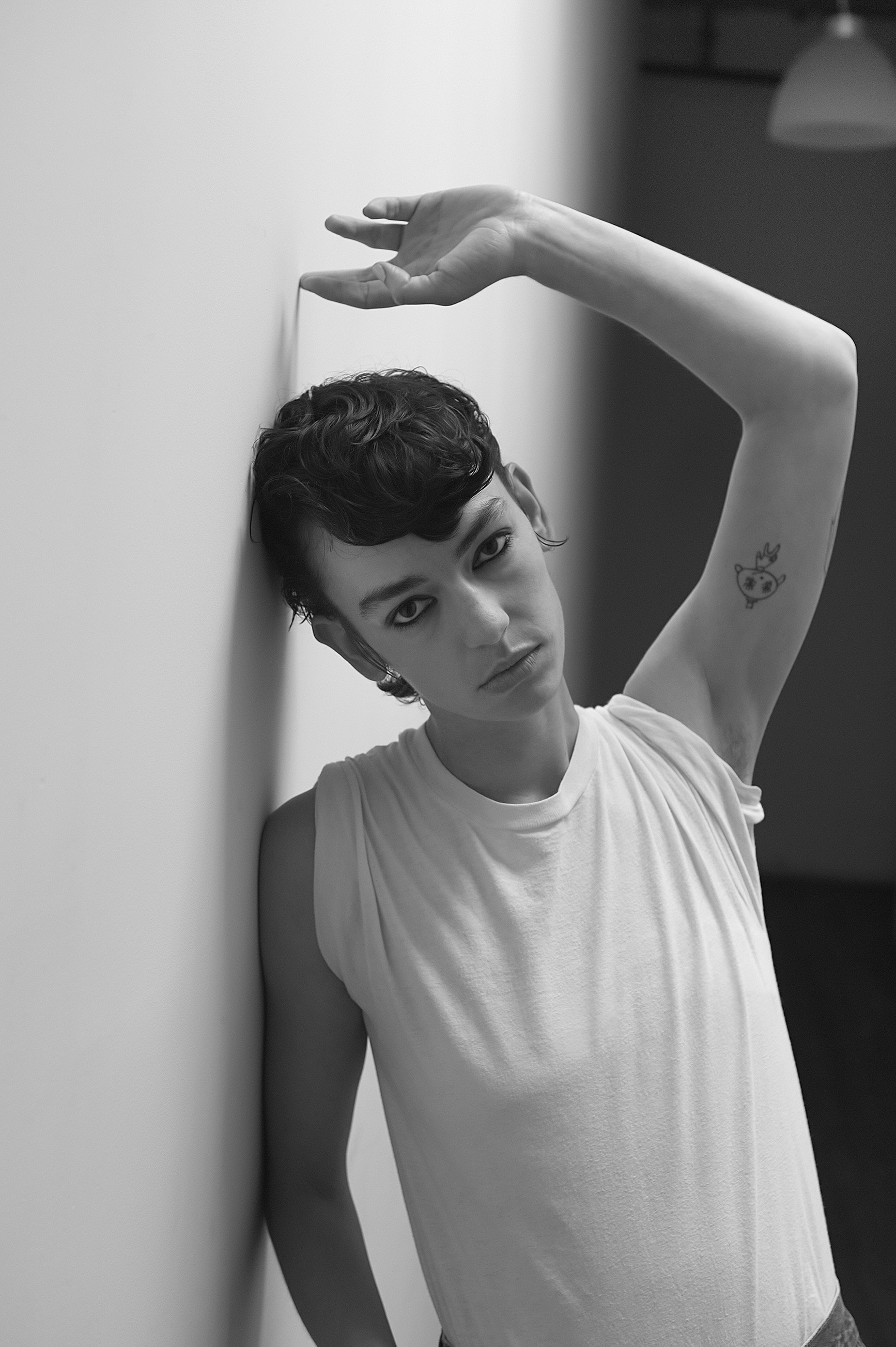
Top RAGGEDY THREADS and trousers SEVEN WONDERS COLLECTIVE
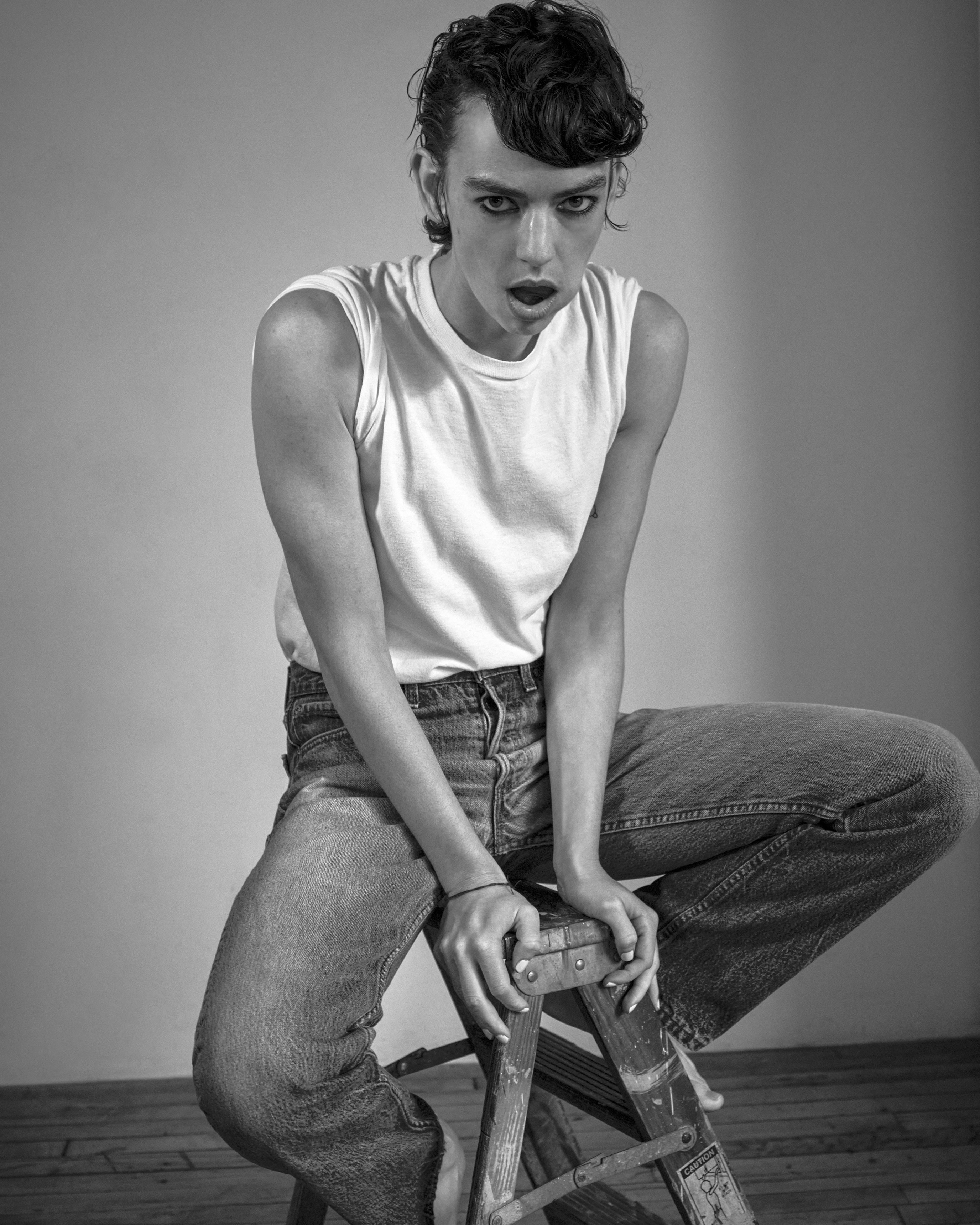
Top RAGGEDY THREADS and trousers SEVEN WONDERS COLLECTIVE
What is your relationship to zombies?
Zombies are all around us, I think. When you say NPCs [non-player characters in gaming], I feel like those are the modern zombies, like an unaccessed life force. In terms of zombie movies, I’d only seen Shaun of the Dead, which I was obsessed with growing up.
Have you seen any of George Romero’s original zombie movies?
I watched the big trilogy getting ready for this: Night of the Living Dead, Dawn of the Dead and Day of the Dead. I was obsessed with Night of the Living Dead. It’s perfect and devastating. I really loved the performance of the sister at the beginning who’s having a mental breakdown.
Barbra.
Yes, Judith O’Dea. I loved her performance. I watched some interviews with George Romero afterwards, and he was talking about having to make up for what people thought was a sexist portrayal of her panic attack. But I was obsessed with it. You so rarely get to see a character that’s processing the early stages of trauma in a dialogue-free way. That girl is just sitting there.
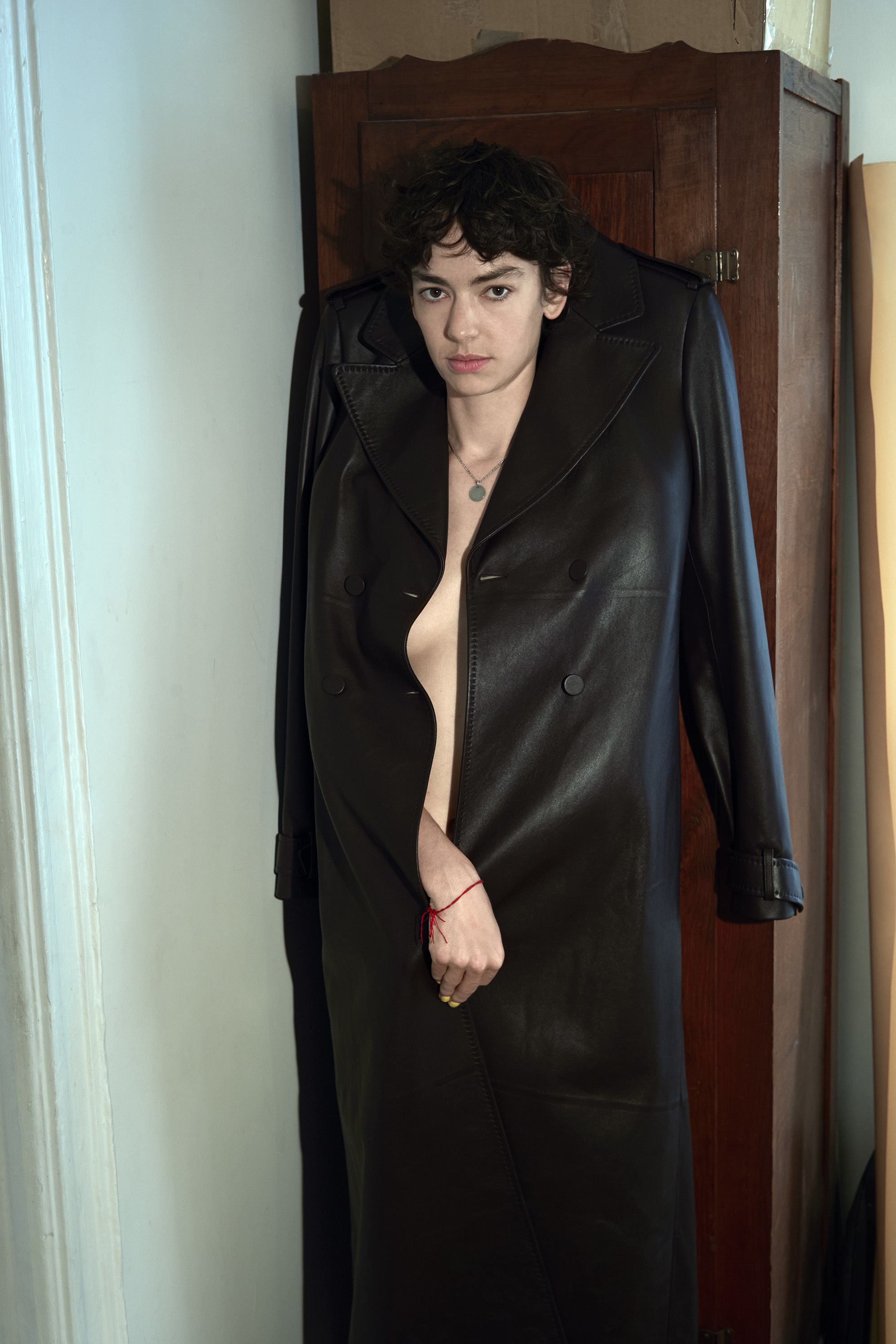
Jacket GABRIELA HEARST
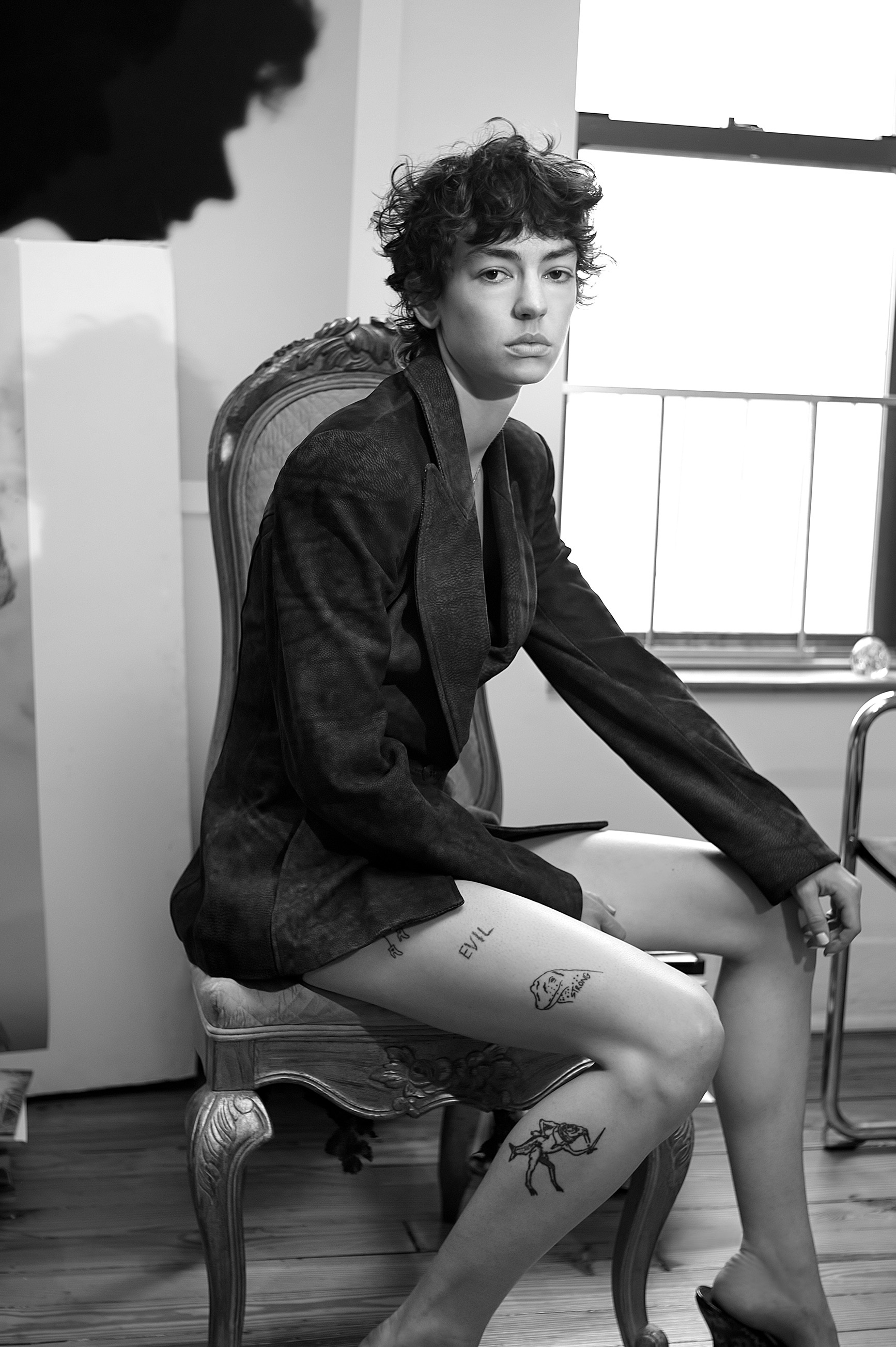
Jacket LAQUAN SMITH
As an actor who is dancing, chameleon-like, through different roles, do you see life as play?
I really do. When I don’t remember that life is play, I get sad. I have crazy OCD that tries to take control of all the perfect and beautiful organs inside my body that are doing as they should. Then my brain goes, “No!” And tries to rip them up, manipulate them and create a solid persona that will be appreciated by society. That is so the opposite of play. That’s not enjoyable for anybody.
What are your tricks for staying in a state of unselfconscious dreaminess?
Reading is number one. Dipping into a really good story that’s not your own. Stretching and working out the kinks in your body. OCD often happens because your body is stiff, your gut’s all tangled up. Eating kimchi and trying to get my microbiomes in order. Making sounds. There’s a parking garage that’s a 15-minute walk from my house. I’ll go there sometimes, to the fourth floor, run around it and yell or sing really loud. Most of the time I can leave before the security guard comes, but sometimes they ask me to leave.
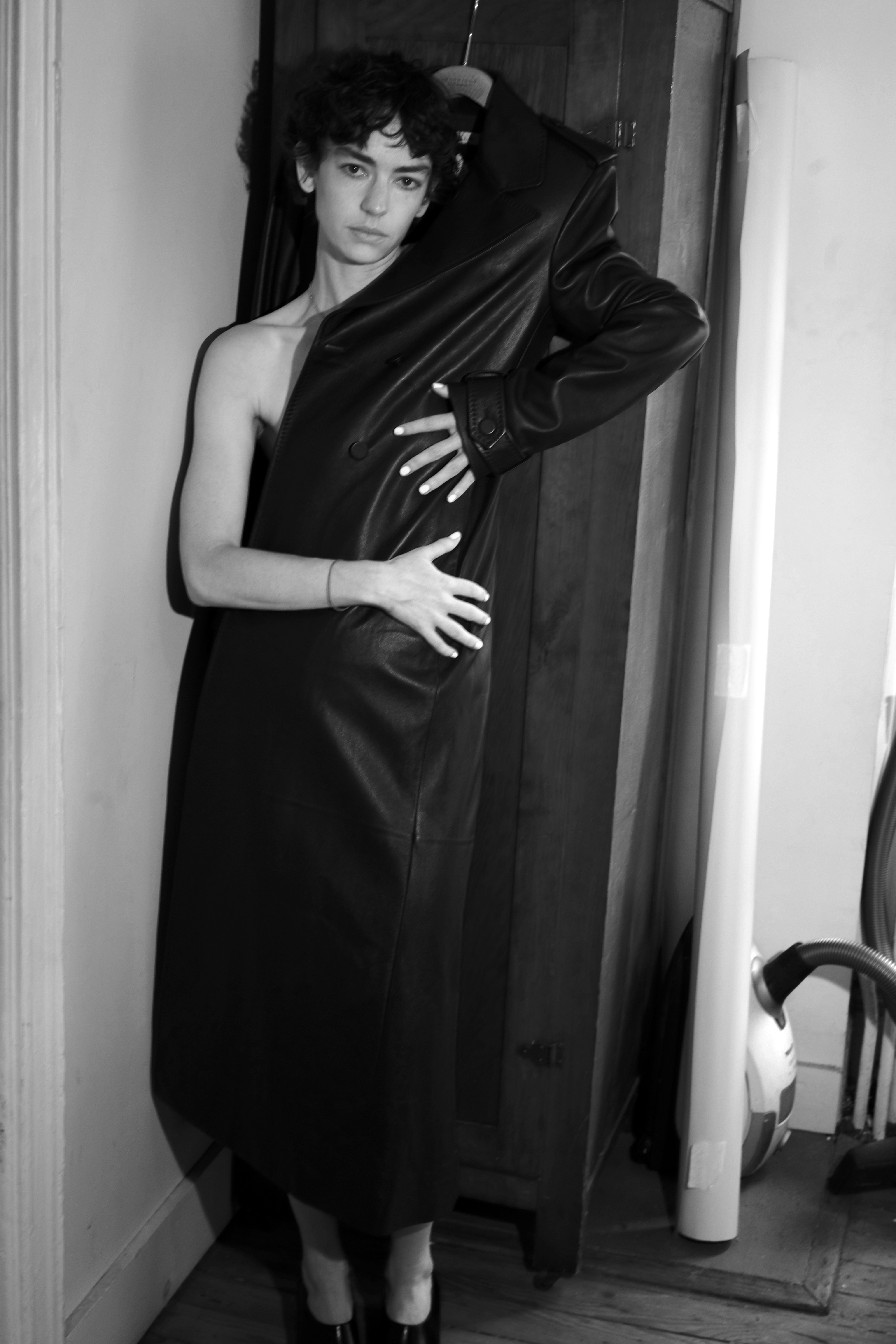
Jacket GABRIELA HEARST
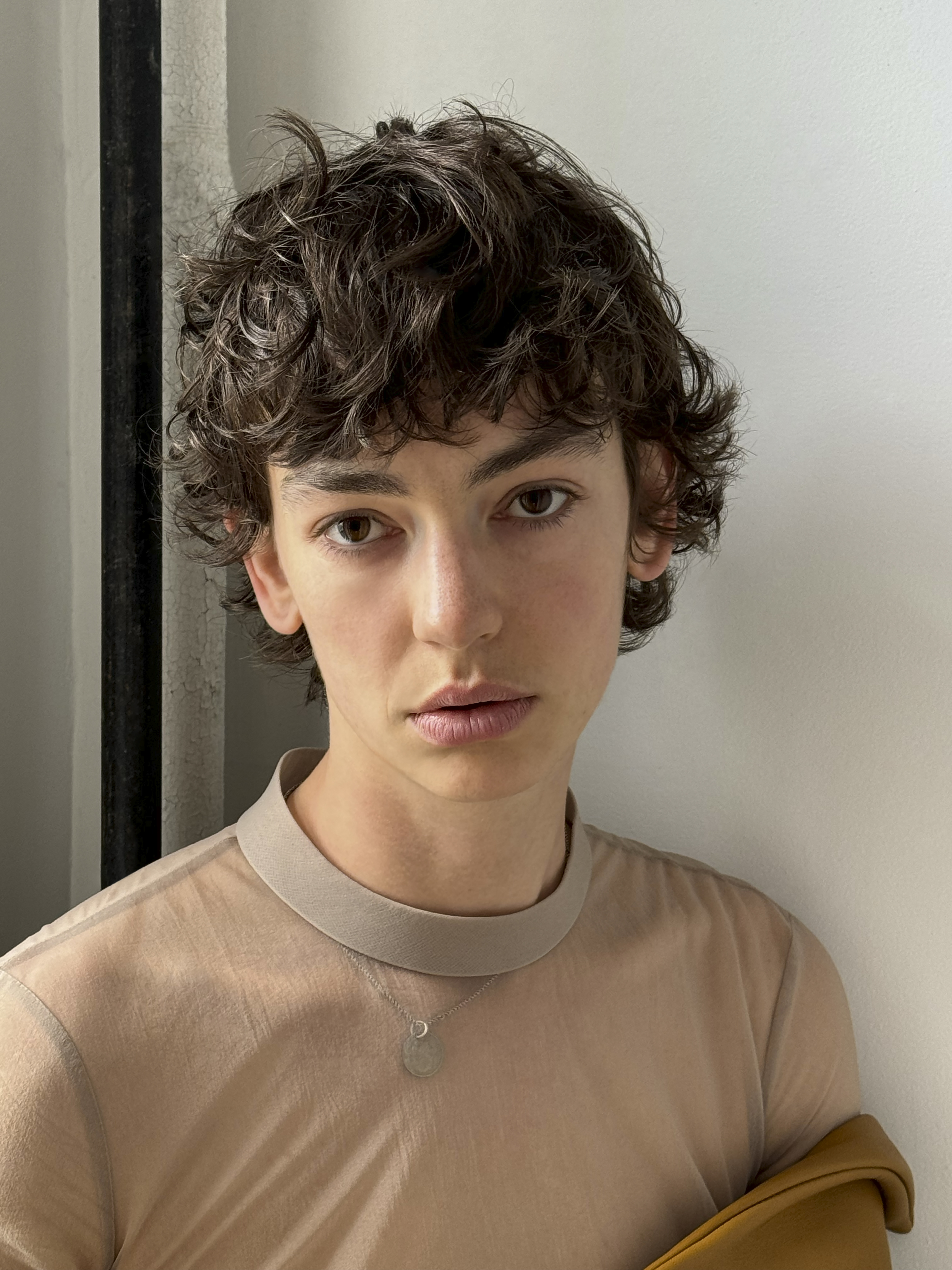
Top TORY BURCH and necklace talent’s own
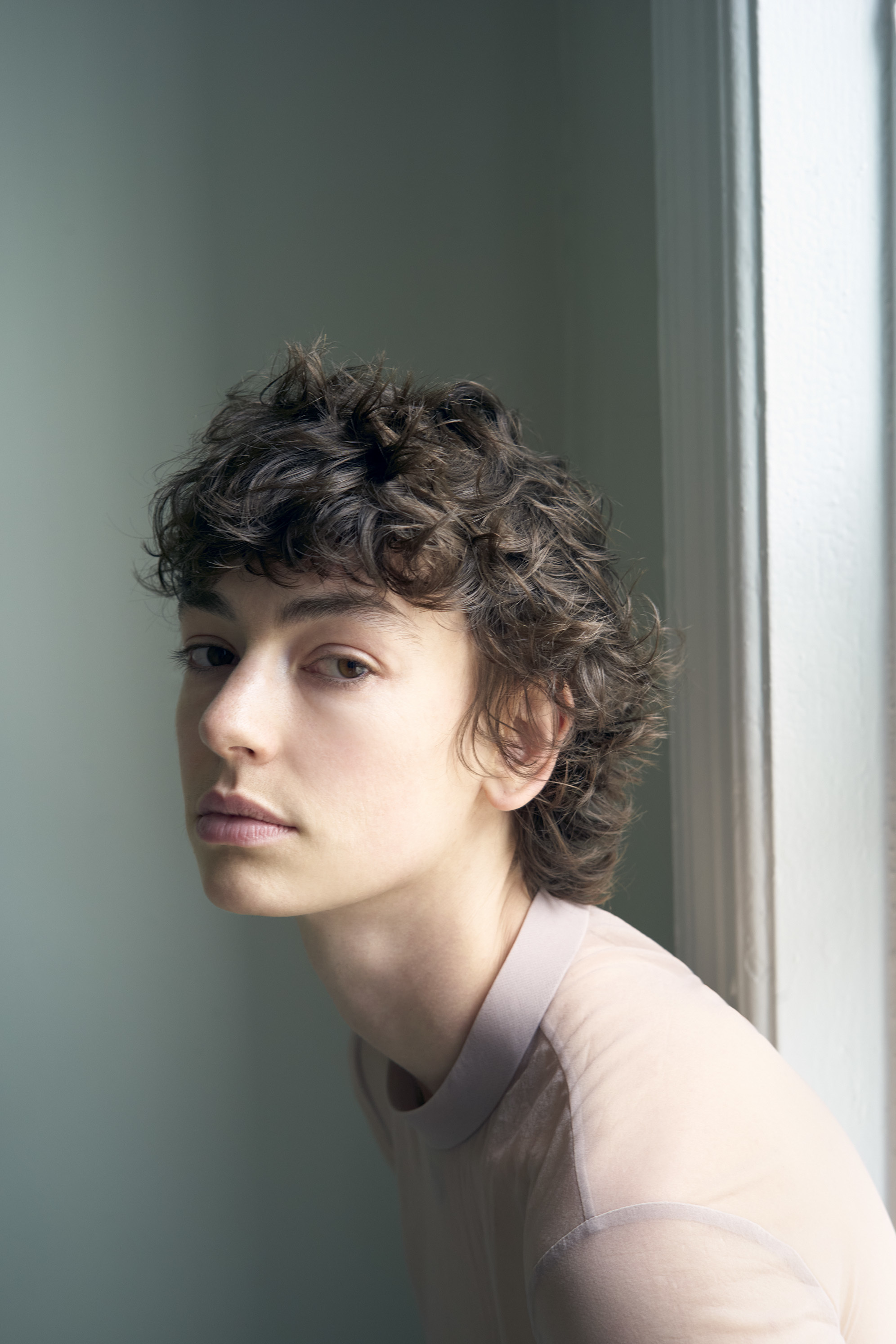
Top TORY BURCH and necklace talent’s own
When you first moved to New York, you must’ve had an idea of what the city was – its legacy, being an artist there. How’s that all feeling in 2024?
You’d be surprised how little I knew about New York when I moved here. I just wanted to be an actor. I knew that this was a way into that. I’ve been here for 11 years. I’ve gotten quite the education by meeting people. My neighbour Peter [Nolan Smith, a poet], for instance, is a huge teacher of mine about what living in New York can be like. I got on food stamps this year; that’s something Peter taught me how to do. He taught me to ask for the vegetables at the bottom of the box at the farmers’ market, you can take them for free. Go to the 169 [Bar] on the Lower East Side. There are places that still feel like magic.
How much do you think you’re a person of routine and stability versus a person of adventure and danger?
I like to think of myself as a creature of adventure and danger, but I don’t think I ever take things far enough. I’m pretty habitual. I ride my bike over the bridge. I ride around downtown and look at people. I’ve always been an outside person, an observer, which I think limits my engagement with danger or adventure. But then I’ll also take risks. I used to spend more time with strangers, especially while travelling. I get more adventurous when I travel.
What kind of places?
I once went to the Old Bailey in London to see a trial, which was pretty cool. We were trying to catch a murder trial but we were late; my friend Charlie was a BBC reporter and he told me anyone can go. They make you deposit all of your stuff across the street. We were too late for the murder but they let us into a drug trial. The lawyer was extremely timid but they did wear one of those cute wigs.
What do you think people want to know about the ending of I Saw the TV Glow?
I think people really want to know if it’s OK to feel hopeful. They have an idea about the end of the world, [of whether] someone knows whether we’re gonna survive or not. People want to know if it’s OK to believe that we will because they don’t want to be caught dead thinking that they were going to live.
They’re looking for a dad.
People are looking for a dad. That’s the internal authority figure; the constant insecurity of not being able to make a parent out of yourself. I remember the thing that hurt me the most or felt most embarrassing [when I was] doing press for …TV Glow was the Hollywood Reporter interview we did. They asked: “What do you think about before you go to sleep?” And I was like, how we can save our species or something. Then I read a comment [on YouTube] that was like: “You’re almost 30! This is the type of existential bullshit I was thinking at 15!”
It was so painful because, first of all, I am 30. And I’m also hopeful in a way that feels embarrassing sometimes. I read an interview where you said that the whole movie is funny if you want it to be, even the ending.
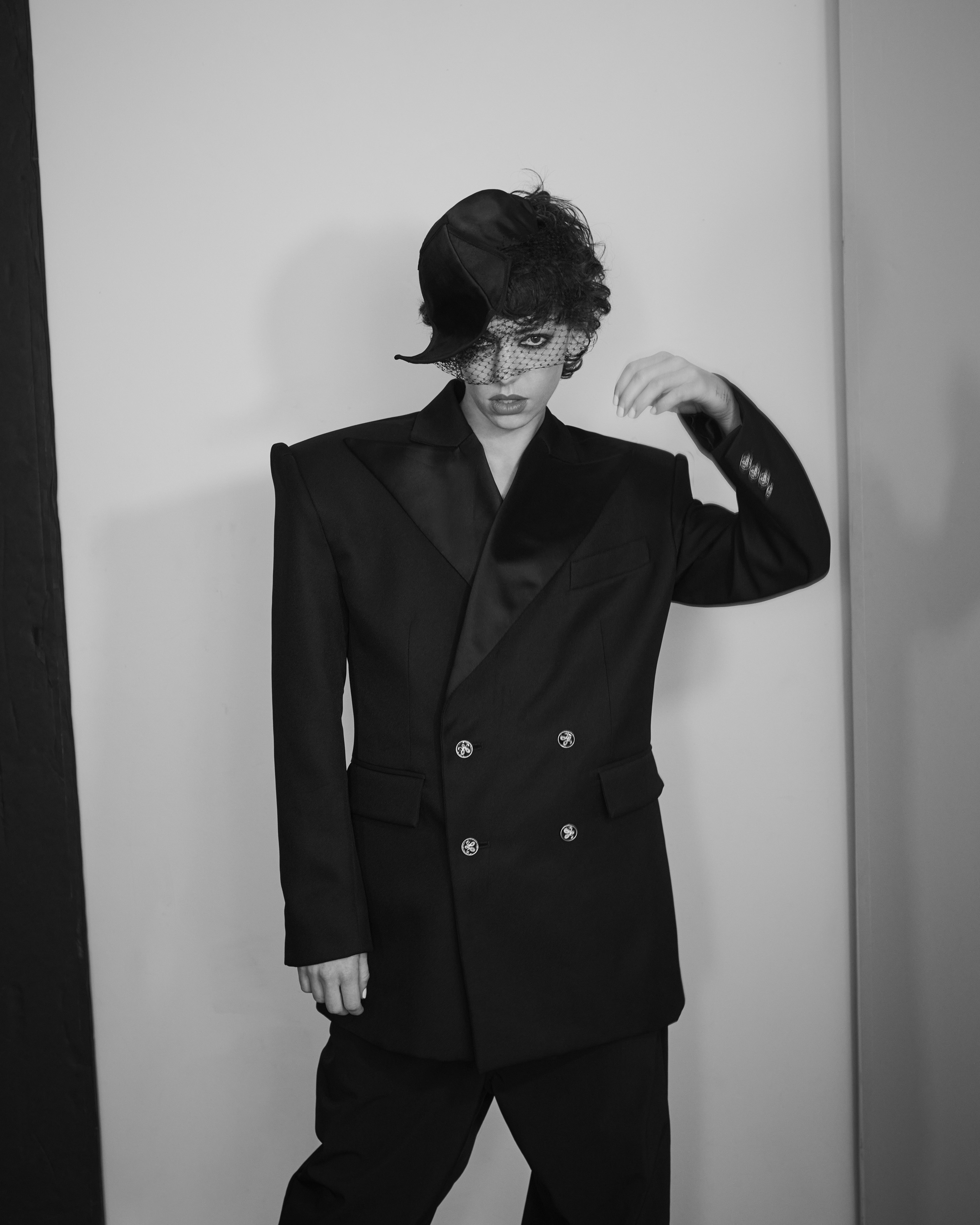
Jacket and trousers WILLY CHAVARRIA and hat courtesy of New York Vintage
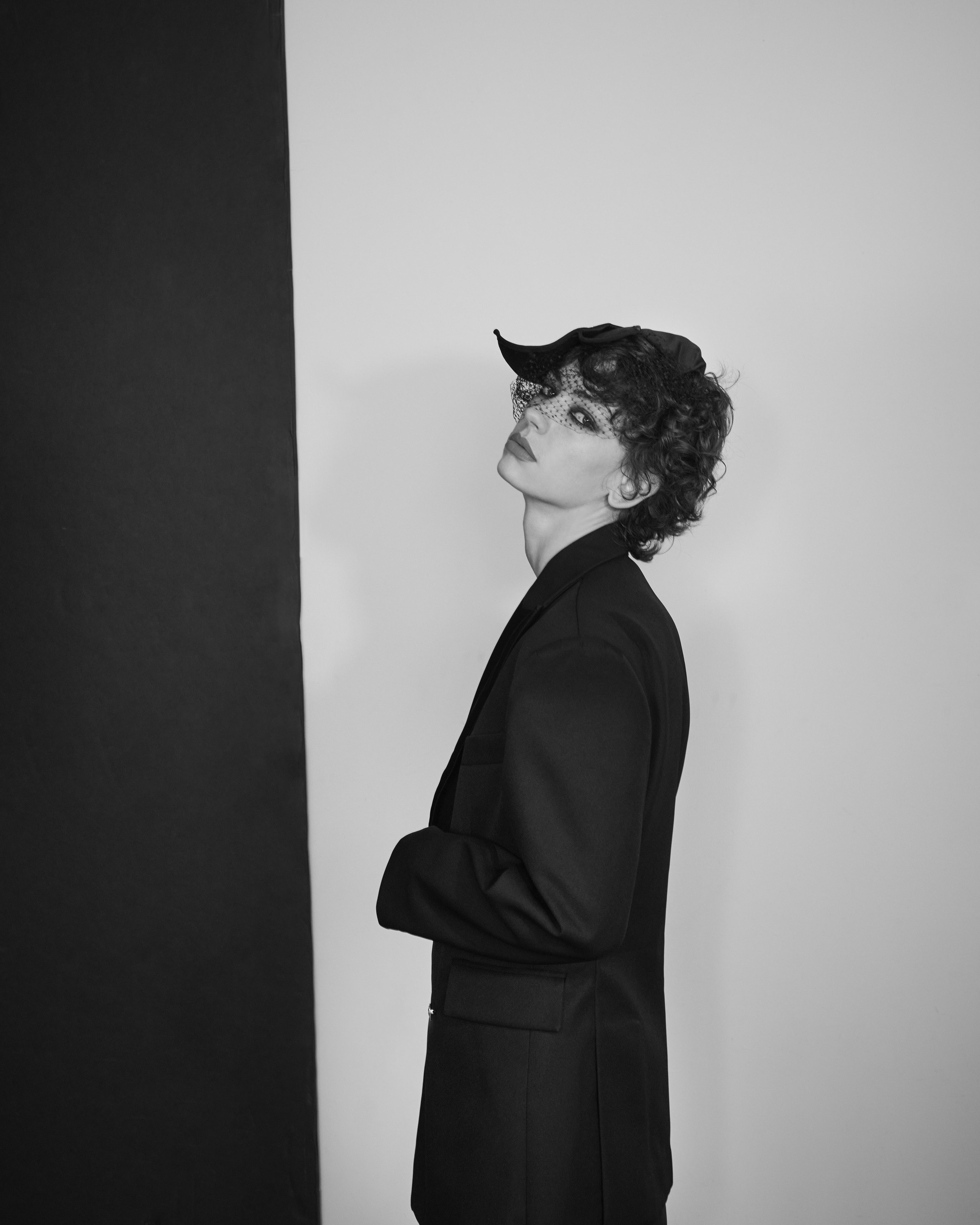
Jacket and trousers WILLY CHAVARRIA and hat courtesy of New York Vintage
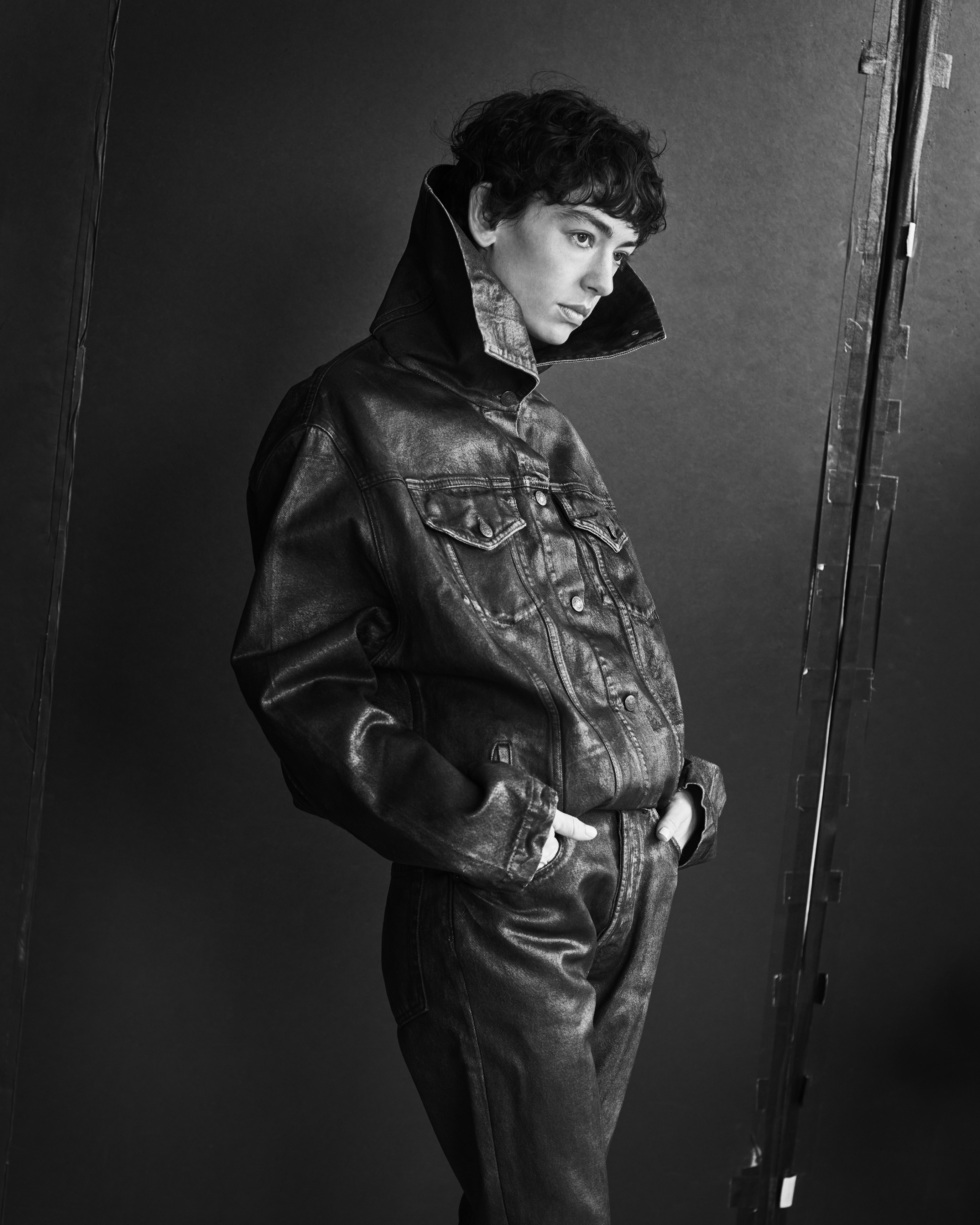
Jacket and trousers ACNE STUDIOS
What do you feel like you were trying to communicate through October Crow, your directorial debut?
It was a completely improvised film. I was learning what I wanted to communicate as we made it. It became about friendship and being faithful to New York City, and to each other’s perversity. The three stars of the film are Alexandra McVicker, my best friend and a really brilliant and sensitive actress who moved to New York a couple of years ago. It’s about her coming here from Kentucky.
She meets James Steele, who’s played by my neighbour Peter. He was a bouncer in New York City in the ’70s, then he was in the Diamond District. Then he moved to Paris and was a bouncer there, then he moved to Thailand for 20 years. He’s completely unhindered by our limitations of gender and sexuality. He’s queer in a way that has taught me a lot about being queer – it’s not about the way you speak or fuck, it’s the way you live and interact with bureaucracy. There’s a cultural fluidity to him.
And then my mom plays the villain, a really religious woman who oversees a BDSM brothel without ever having to touch it. It’s about these three stages of being: complete naiveté, complete perversity and then false altruism. It’s about the humour in those three truths, how there’s no way to separate the three of them and how they all feed off but are critical of and fear each other. What I wanted to do with the movie was prove we could make it, or pay tribute to people who I consider great teachers in my life.
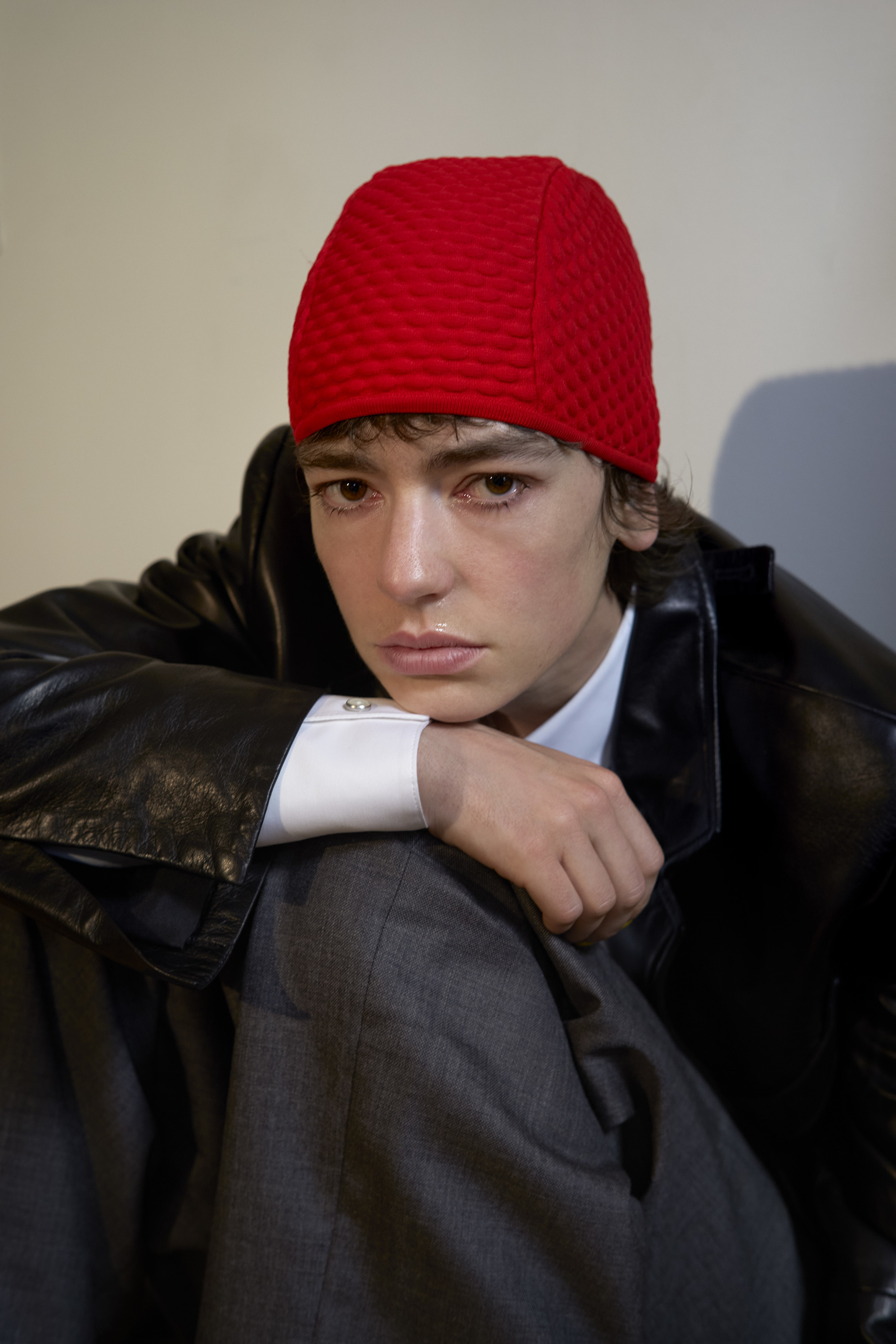
Shirt, trousers and hat PRADA and jacket PROENZA SCHOULER
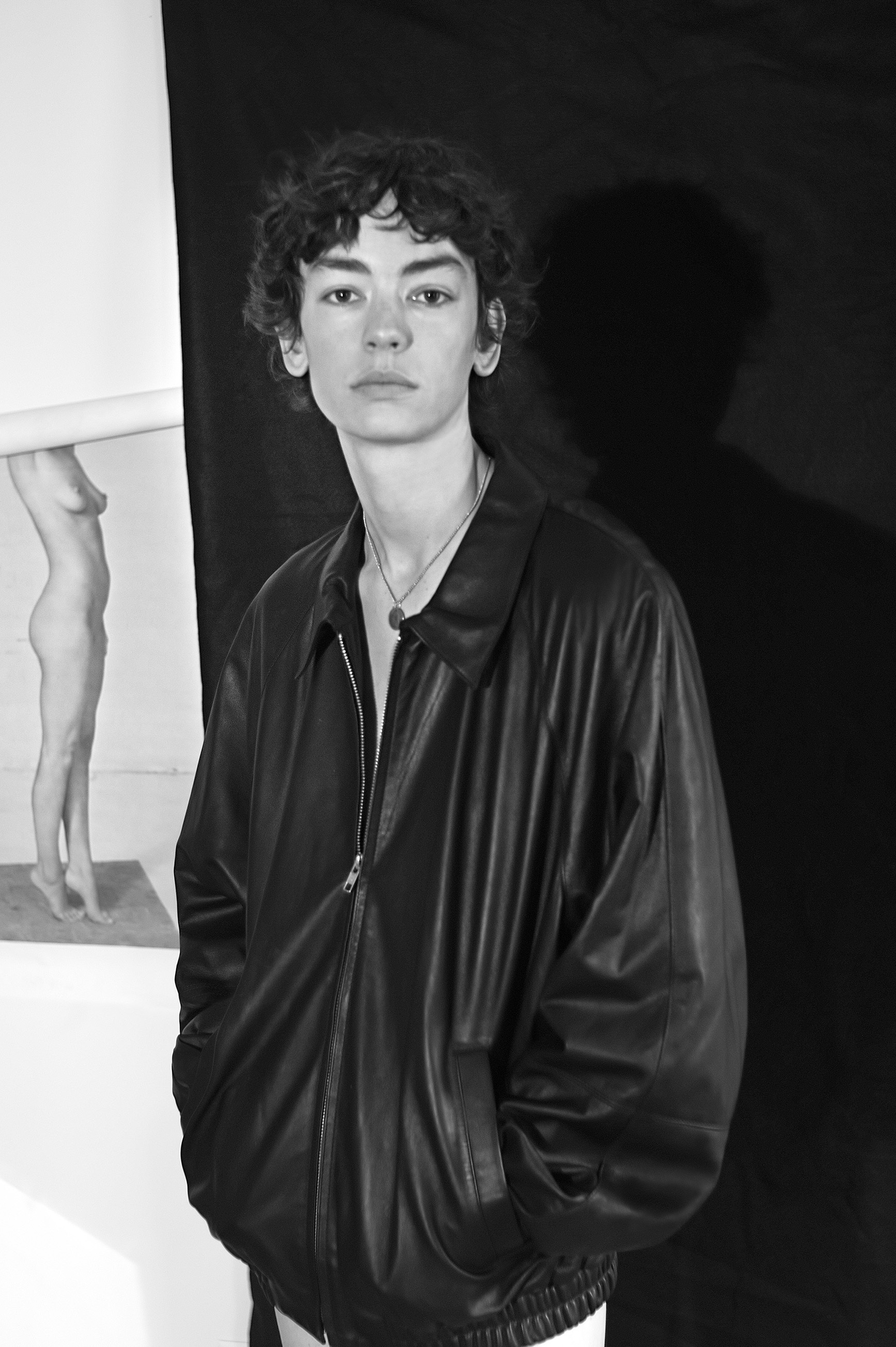
Jacket MARYAM NASSIR ZADEH
It sounds like the goal of proving that you could make it – improvised, on an iPhone and without much worry about the traditional process of how films are made in America – was its own form of play. Why did you want to make it in that way?
It felt in the vein of the work that myself and [producer] Zach Donovan [make]. He made the movie with me and we run Waif magazine together. It’s anti-trend – a practice of stripping ourselves of what it means to be cool or in the zeitgeist. It’s like the only way we can stay honest is by refusing to look beautiful and polish ourselves, which I think is in a long tradition of work that I am obsessed with. I love John Waters. I love Midnight Cowboy, [John] Cassavetes [films]. Recently, my friends gave me a copy of [1972 movie] Fleshpot on 42nd Street, [directed] by Andy Milligan, which feels like actual porn. Like, [porn actor] Harry Reems is in it and there’s actual fucking. It was quite a surprise for me when I put it on the projector in my house and my roommate was like… um?
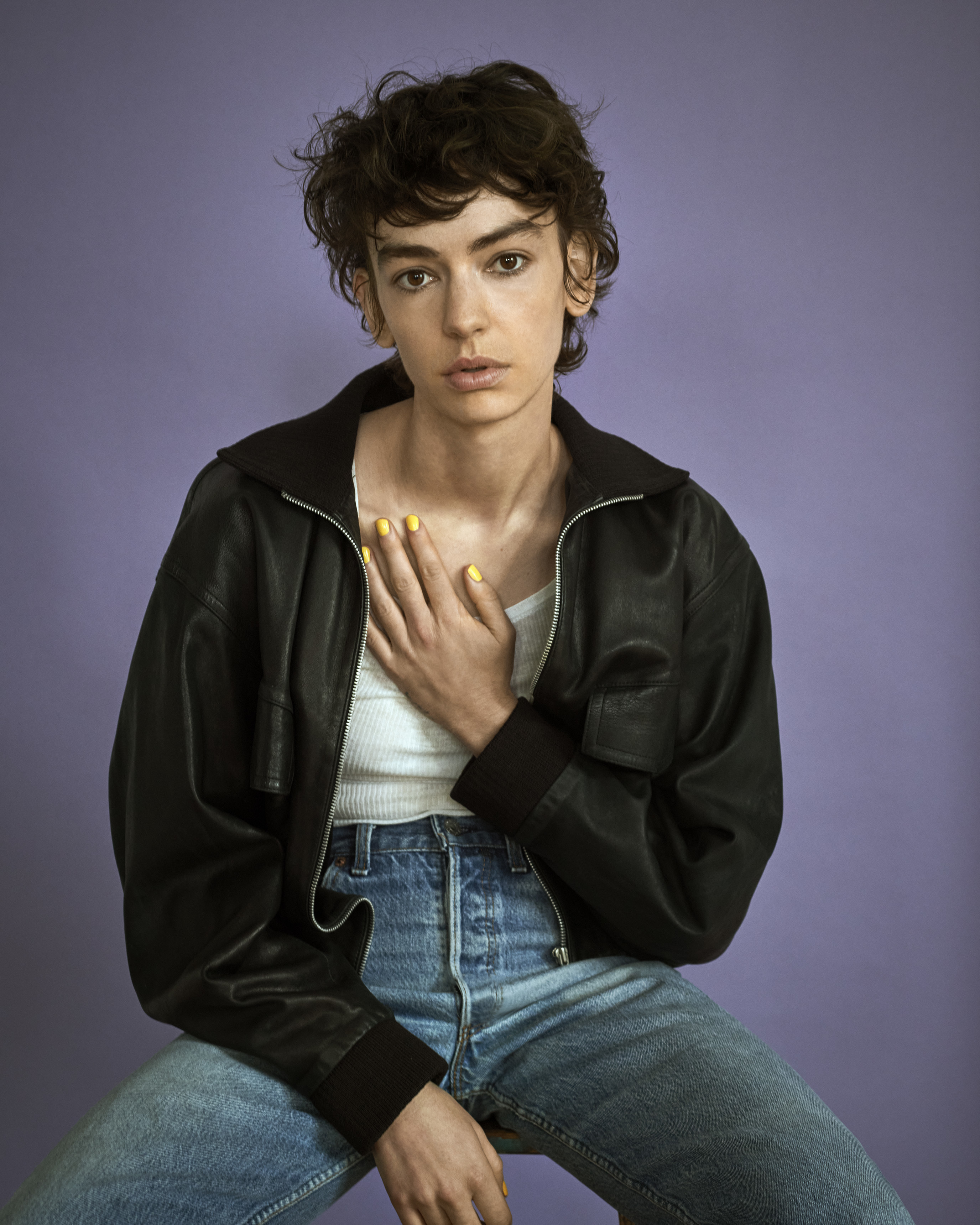
Jacket archive ALAÏA courtesy of Artifact, top RAGGEDY THREADS and trousers SEVEN WONDERS COLLECTIVE
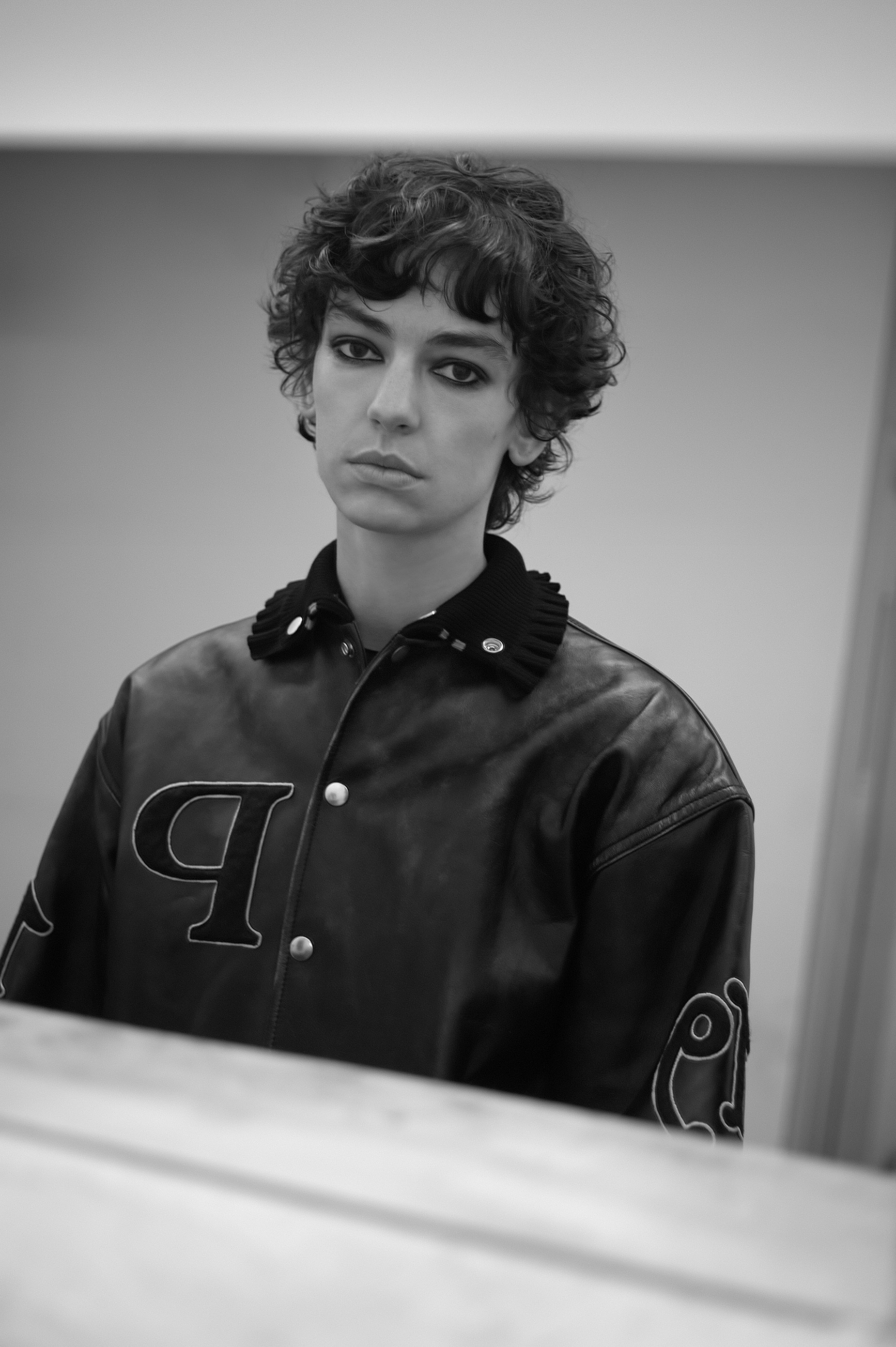
Jacket PRADA
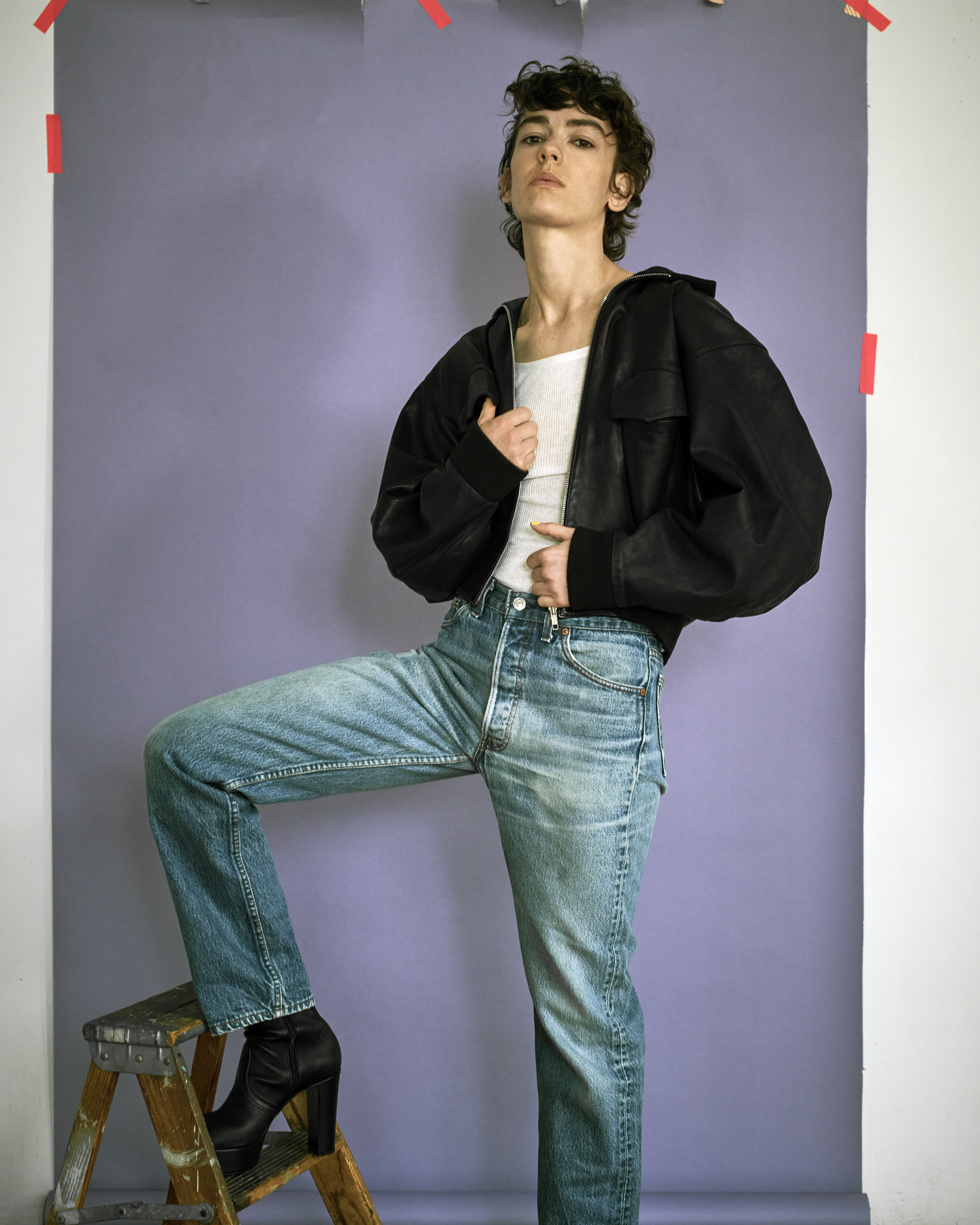
Jacket archive ALAÏA courtesy of Artifact, top RAGGEDY THREADS, trousers SEVEN WONDERS COLLECTIVE and shoes CHANEL
When I first met you, you’d just finished Atypical. You were very much in this space of separating yourself from Casey, the character you played. Where are you at with all that now?
It’s totally and completely separate from me. When people stop me and say, “Are you the girl from Atypical?” it is like someone’s reaching out from another dimension. It’s so distant, but I’m so grateful for it. I spent all my money, which is another funny thing about it. It didn’t set me up because I was a dumbass. I’m still close friends with a lot of people from the show, like [actors] Nik Dodani and Keir [Gilchrist]. He has stayed with us a couple times recently here – he’s my brother for life. He took me to a punk show on the Lower East Side the other day. We moshed.
You’re one of the best people to mosh with.
You have to mosh, Jane.
I agree. We all live a lot of lives, right? I imagine the more distance you get from an era, the easier it becomes to get away from it. I’m going through this with …TV Glow right now. It’s hard to do when it’s such a public endeavour. It’s not just where you are in your life, it’s what you’re publicly known for. Do you have any advice on creating that space between the public perception of you and you as a human being?
[It’s about] the way that you deal with any intrusive thoughts, I think. I’m also dealing with this with …TV Glow, which I’m grateful for. These things happen fast – especially because we had such deep roots with it, you more than me. The crowd’s sound feels like the truth at the beginning, because you’re looking for someone to tell you what this thing actually is – at least I was. Then that fades and it turns out you’re the one who knows what it actually is. With Atypical and any public endeavour, it’s like, I’m the one who knows what the experience was, the way that it shaped me, and that’s it. What people think about it has nothing to do with me.
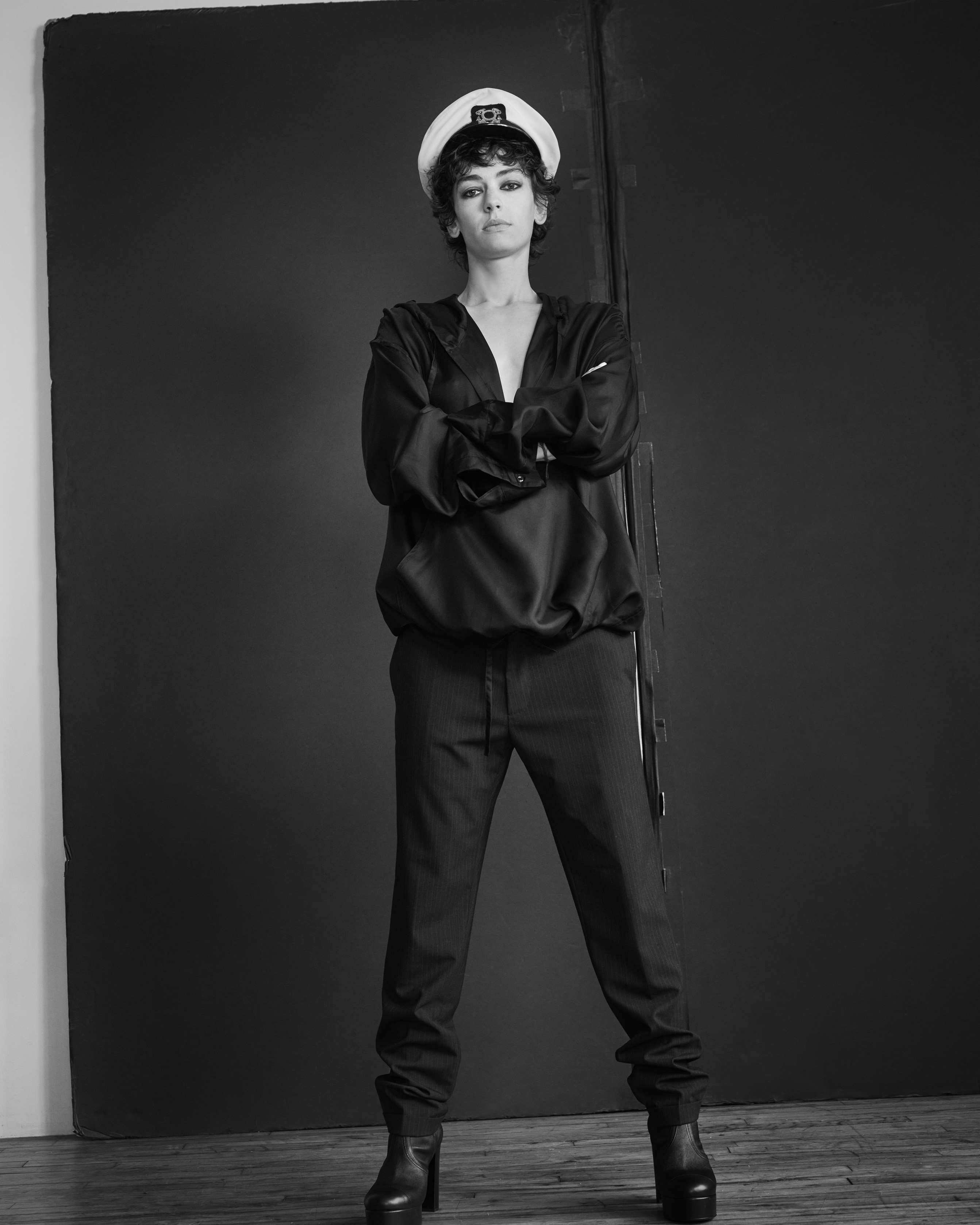
Top and trousers DSQUARED2, hat courtesy of New York Vintage and shoes CHANEL
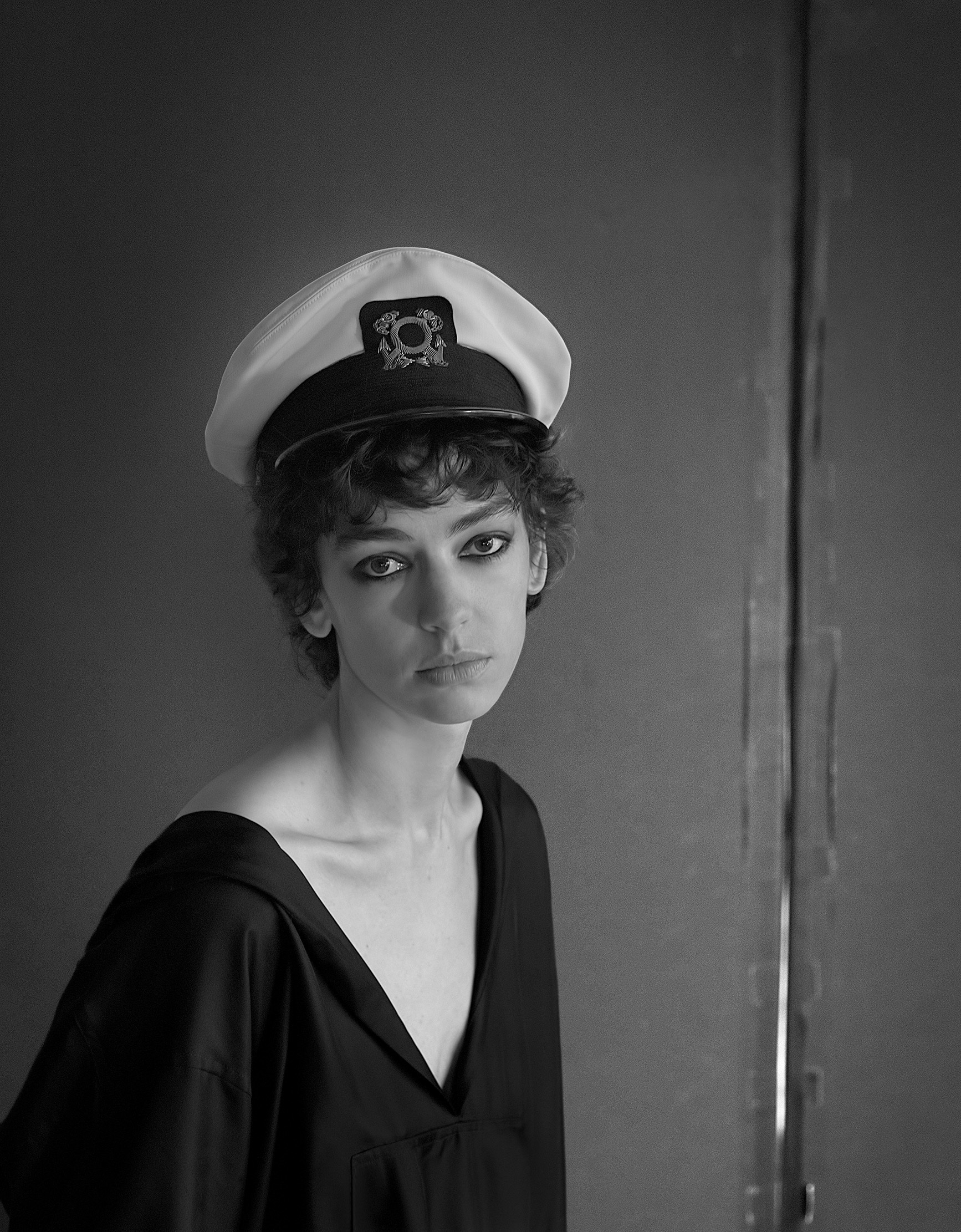
Top and trousers DSQUARED2, hat courtesy of New York Vintage and shoes CHANEL
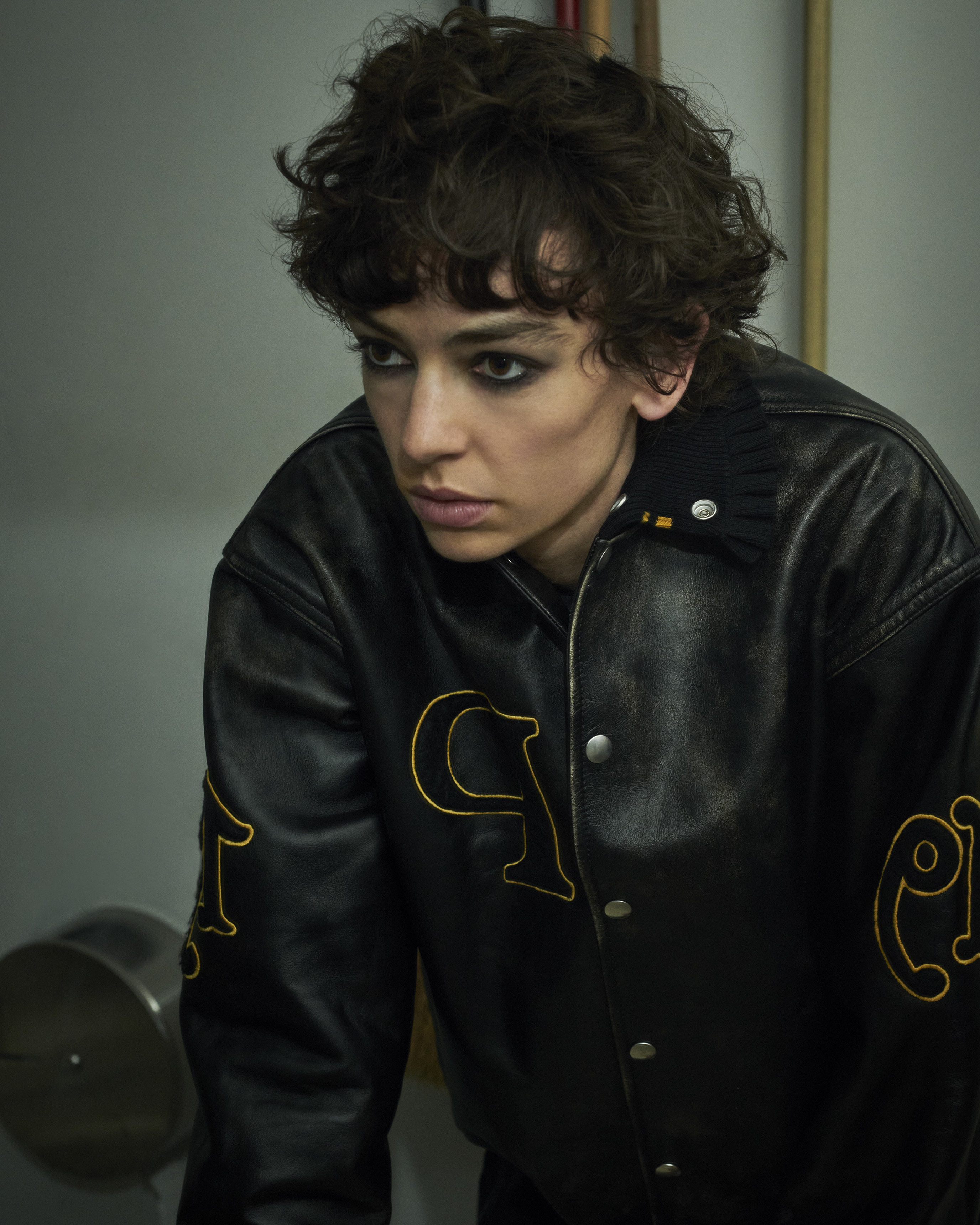
Jacket and dress PRADA
To end, as we should, on …TV Glow, what was your favourite part of making it?
I felt different doing this movie than any other – very focused and like I wanted to be by myself, with Maddy and her music and her ideas and moods. It was very exciting. I knew we were making something really special. I’d come to set even when I wasn’t working sometimes, just to watch. I remember coming to see the first scene filmed between Lindsay [Jordan] and Helena [Howard] as [fictional characters] Isobel and Tara in The Pink Opaque – the scene where they’re sitting at the dock on the Psychic Plane together.
I felt so blown away by the atmosphere, how charged it felt. It felt so brave and strange. It helped Maddy to see what The Pink Opaque was. It helped make it all feel more real.
What did you get out of making it? And what do you hope the world gets out of it?
My life feels completely transformed by it. I was released from so many inhibitions or fears that I had about myself as an actor and a person in the world. It’s really been an opportunity to stop explaining myself and realise that the only explanations we have are in myth.
It has allowed me to feel more comfortable dreaming and learning about the stories that we are living inside of, and what they make us believe about ourselves. I hope that viewers will feel unlocked by the film. I have no intention or expectation from audiences to feel a certain way, but when I watched it, I felt very moved and greater than my physical body. I feel connected to a universal spirit. I hope people will allow themselves to sit with the way the film makes them feel, and treat themselves with kindness.
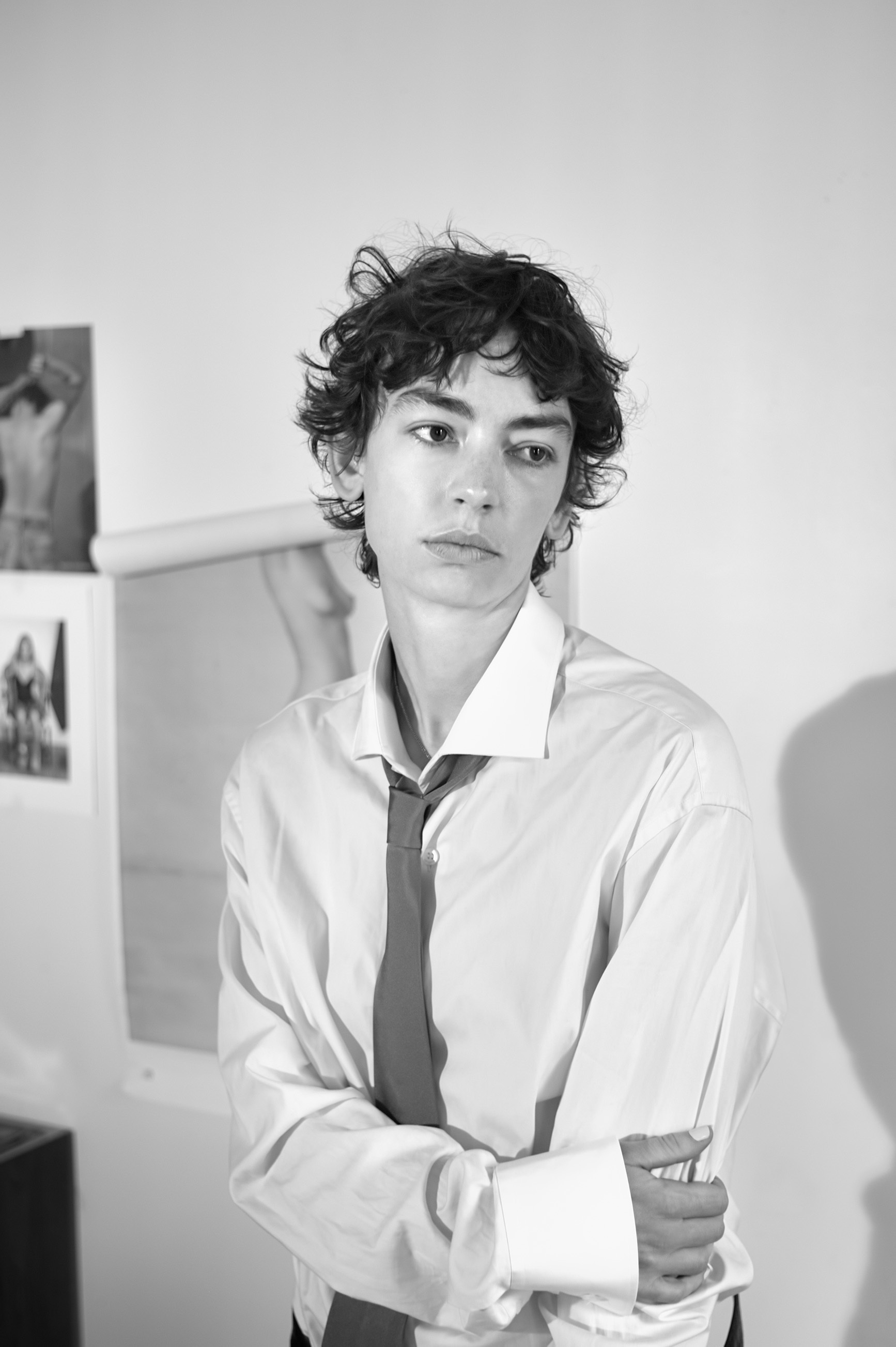
Shirt and tie PRADA
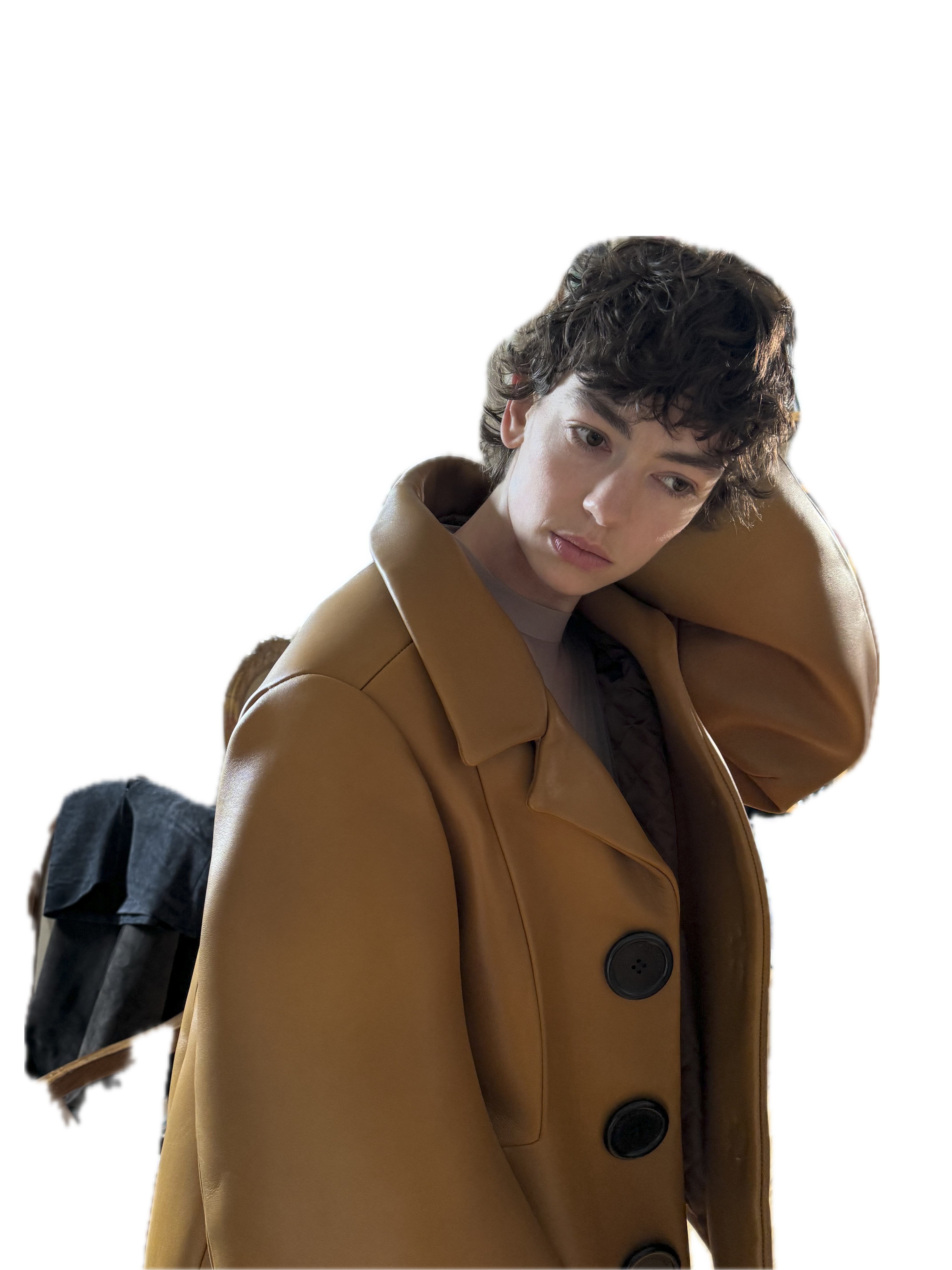
Coat MARC JACOBS
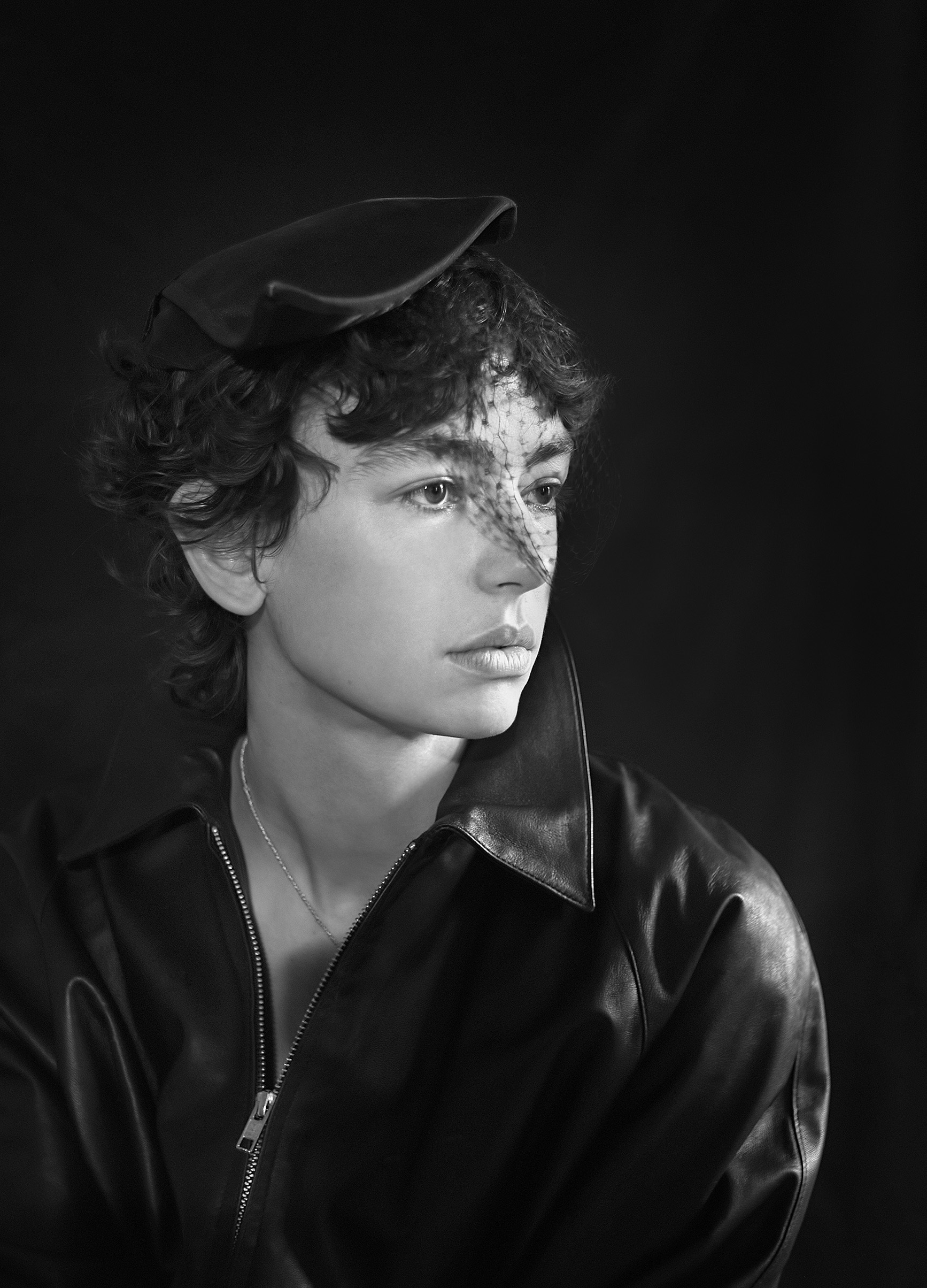
Jacket MARYAM NASSIR ZADEH and hat courtesy of New York Vintage
CREDITS
HAIR Joey George at Streeters MAKEUP Yumi Lee at Streeters LIGHTING DESIGNER Ari Sadok STYLIST’S ASSISTANTS Meena Jannah, Sierra Estep and Verity Azario























